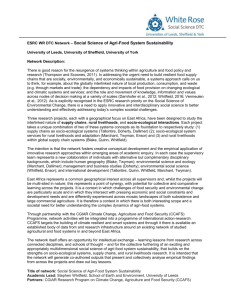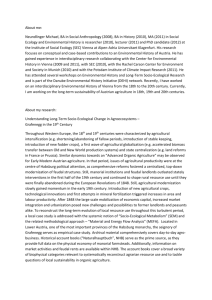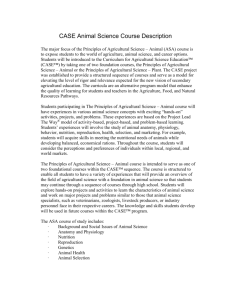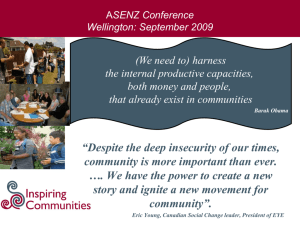White Rose PhD Studentship
advertisement
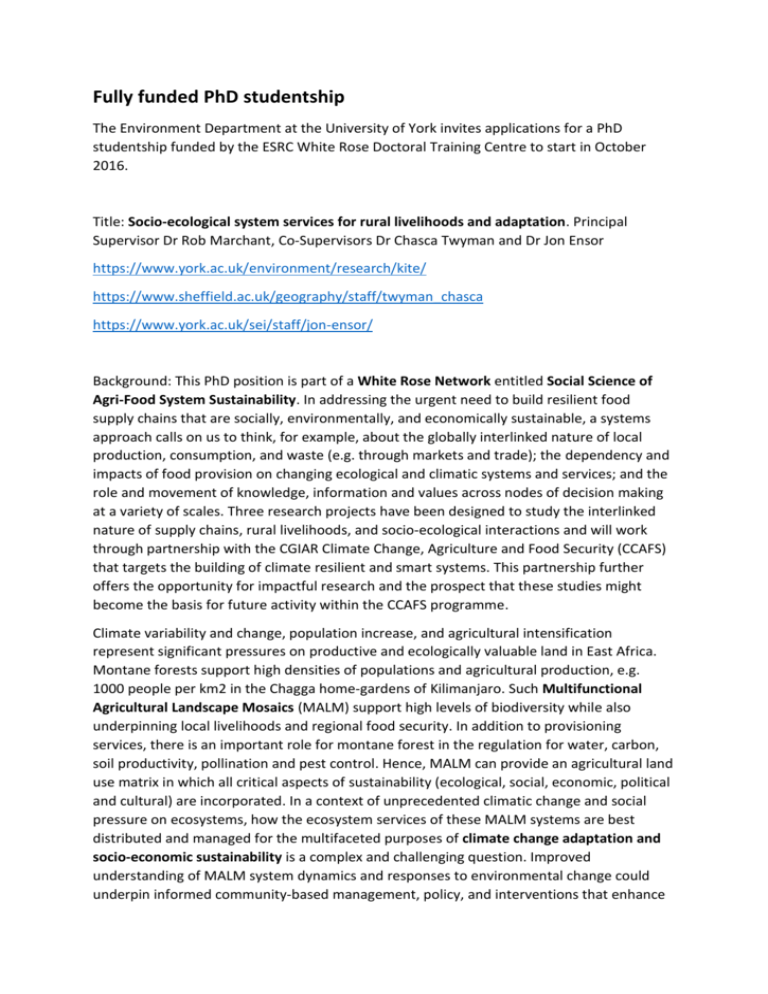
Fully funded PhD studentship The Environment Department at the University of York invites applications for a PhD studentship funded by the ESRC White Rose Doctoral Training Centre to start in October 2016. Title: Socio-ecological system services for rural livelihoods and adaptation. Principal Supervisor Dr Rob Marchant, Co-Supervisors Dr Chasca Twyman and Dr Jon Ensor https://www.york.ac.uk/environment/research/kite/ https://www.sheffield.ac.uk/geography/staff/twyman_chasca https://www.york.ac.uk/sei/staff/jon-ensor/ Background: This PhD position is part of a White Rose Network entitled Social Science of Agri-Food System Sustainability. In addressing the urgent need to build resilient food supply chains that are socially, environmentally, and economically sustainable, a systems approach calls on us to think, for example, about the globally interlinked nature of local production, consumption, and waste (e.g. through markets and trade); the dependency and impacts of food provision on changing ecological and climatic systems and services; and the role and movement of knowledge, information and values across nodes of decision making at a variety of scales. Three research projects have been designed to study the interlinked nature of supply chains, rural livelihoods, and socio-ecological interactions and will work through partnership with the CGIAR Climate Change, Agriculture and Food Security (CCAFS) that targets the building of climate resilient and smart systems. This partnership further offers the opportunity for impactful research and the prospect that these studies might become the basis for future activity within the CCAFS programme. Climate variability and change, population increase, and agricultural intensification represent significant pressures on productive and ecologically valuable land in East Africa. Montane forests support high densities of populations and agricultural production, e.g. 1000 people per km2 in the Chagga home-gardens of Kilimanjaro. Such Multifunctional Agricultural Landscape Mosaics (MALM) support high levels of biodiversity while also underpinning local livelihoods and regional food security. In addition to provisioning services, there is an important role for montane forest in the regulation for water, carbon, soil productivity, pollination and pest control. Hence, MALM can provide an agricultural land use matrix in which all critical aspects of sustainability (ecological, social, economic, political and cultural) are incorporated. In a context of unprecedented climatic change and social pressure on ecosystems, how the ecosystem services of these MALM systems are best distributed and managed for the multifaceted purposes of climate change adaptation and socio-economic sustainability is a complex and challenging question. Improved understanding of MALM system dynamics and responses to environmental change could underpin informed community-based management, policy, and interventions that enhance integrated water and land management processes, and improve agro-ecosystems function and productivity. But, it is increasingly recognised that successful management of natural resources and adaptation to change within such complex systems depends too on processes for knowledge sharing and coproduction, the potential for which is shaped by social, cultural and political relations between diverse stakeholders. The PhD will combine the local and experiential knowledge of residents and land managers with the techniques and tools of socio-ecological system mapping to inform management. Critical reflection on social dynamics and incomplete knowledge politics will be essential for achieving just outcomes within such a management tool. Additional logistical support for fieldwork conducted in Taita will be provided through affiliation to the Terra research station located at Wyundani in the Taita Hills run by research collaborators at the University of Helsinki. Key project objectives To assess the interrelated functions and services of MALM in the Taita Hills of southern Kenya by mapping, through participatory GIS, the agricultural land use matrix. To evaluate nature-based adaptation practices (afforestation, conservation agriculture, irrigation and water management, and integrated pest management) against projected future change and locally prioritized needs (e.g. for achieving food security, providing livelihood opportunities, maintaining biodiversity, and fulfilling cultural, aesthetic, conservation and recreational needs). To critically reflect on the way that politics and social dynamics play out within this process of knowledge generation and management Selection criteria: The project is open to applicants with at least a 2i degree (and ideally a Masters) in Development Studies, Sociology, Anthropology, Geography, or the Environmental sciences. Interests in rural development and/or international development would be an advantage although full support and training to conduct this ambitious project will be provided. Existing expertise is obviously a plus, especially relevant field and analytical skills. For further information on the project or an informal discussion please contact the main supervisor (robert.marchant@york.ac.uk). Further information including eligibility and application details, is available here: https://www.york.ac.uk/study/postgraduate/fees-funding/research/esrc/ Deadline for applications: 12 noon, 5th March 2016 Interviews are scheduled for the 16th March 2016 (1-3PM) in the Environment Department, University of York.
